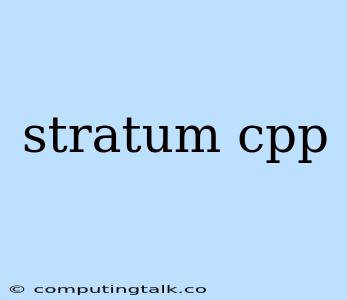Stratum: A Powerful C++ Framework for Building Scalable and Reliable Applications
Stratum is a modern, high-performance C++ framework that simplifies the development of complex applications, particularly those requiring scalability, reliability, and ease of maintenance. It provides a solid foundation for building applications that are robust, efficient, and adaptable to changing needs.
Why Choose Stratum?
There are several compelling reasons to consider Stratum for your next C++ project:
- Scalability: Stratum is designed for applications that need to handle large volumes of data and users, making it suitable for high-performance computing, distributed systems, and cloud-based applications.
- Reliability: The framework incorporates features that ensure the stability and resilience of your application, including robust error handling, resource management, and thread-safe design.
- Maintainability: Stratum promotes code reusability and modularity, simplifying the development process and reducing the potential for errors.
- Simplicity: While offering powerful features, Stratum is designed to be user-friendly, allowing developers to focus on application logic rather than low-level system details.
Key Components of Stratum
Stratum comprises several key components:
- Networking: Provides a powerful and efficient mechanism for handling network communication, supporting various protocols and allowing for flexible network configurations.
- Concurrency: Enables developers to effectively leverage multi-core processors through a well-defined thread management system and asynchronous operations.
- Messaging: Facilitates communication between different parts of your application, allowing for distributed architectures and improved system responsiveness.
- Logging: Offers a robust logging system that captures critical events and provides valuable insights into application behavior.
- Configuration: Provides a flexible and easy-to-use mechanism for managing application settings and adapting to different environments.
How to Get Started with Stratum
- Installation: Download the Stratum source code or use a package manager to install the required libraries.
- Project Setup: Create a new project directory and set up the necessary build files.
- Explore the Documentation: Review the Stratum documentation to understand its various components and how to use them effectively.
- Write Your Application Logic: Leverage the framework's components to build your core application functionality.
- Test and Deploy: Thoroughly test your application in different environments to ensure its stability and performance.
Stratum in Action: A Simple Example
Let's demonstrate a basic example of using Stratum to create a simple server that echoes back received messages:
#include
#include
int main() {
// Create a server using TCP protocol on port 8080.
stratum::network::Server server("tcp://*:8080");
// Start listening for incoming connections.
server.listen();
while (true) {
// Accept a new connection.
auto socket = server.accept();
// Read data from the socket.
std::string message;
socket->read(message);
// Echo the message back to the client.
socket->write(message);
// Close the connection.
socket->close();
}
return 0;
}
This simple example demonstrates the core concepts of using Stratum for network communication. You can extend this to implement more complex functionalities like handling multiple clients, using different protocols, and managing resources efficiently.
Advantages of Using Stratum
- Increased Development Speed: Stratum's well-defined components and APIs streamline the development process, allowing developers to focus on core business logic.
- Improved Code Quality: The framework promotes best practices, code reusability, and modularity, resulting in cleaner, more maintainable code.
- Enhanced Performance: Stratum leverages modern C++ features and optimized libraries to ensure high performance and scalability.
- Strong Community Support: Stratum has a growing community of developers who contribute to its development and provide support to users.
Conclusion
Stratum is a powerful and versatile C++ framework that simplifies the development of reliable, scalable, and maintainable applications. By leveraging its components and features, developers can build robust applications that meet the demands of modern software development. Whether you are building high-performance computing applications, distributed systems, or cloud-based services, Stratum can provide the necessary tools and infrastructure for success.
